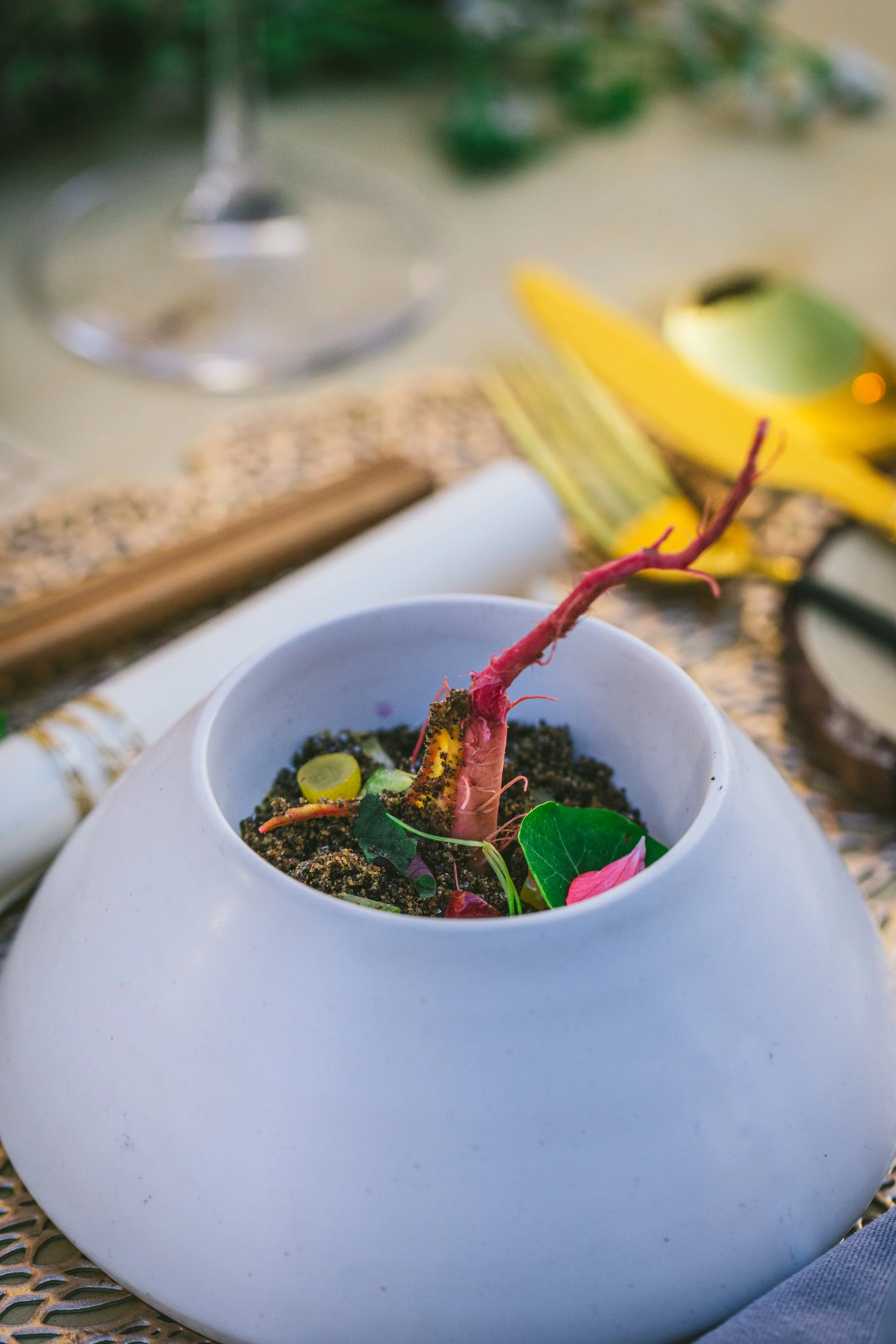Minh Phan: The LA Chef Who Earned a Michelin Star with No Kitchen
Photos by Carolina Korman
Minh Phan’s Phenakite now occupies Ace Mission Studios, a 28,000 foot space in Boyle Heights, and is part of an immersive art show called A Forest For the Trees.
Inspired by the powerful nature writings of The Atlantic, the magazine has partnered with Superblue and artist Glenn Kaino in a surreal installation “designed to inspire audiences to reimagine their relationship with the natural world.”
Directed by Kaino, it’s also a collaboration with Grammy-winning producer and musician David Sitek, as part of their new band project, High Seas. Think animatronic trees, interactive sound sculptures, fire illusions and Minh’s spectacular food. An integral and exciting part of the experience, Phenakite is the fine dining restaurant.
Every day Chef Minh pulls ingredients from a nifty greenhouse outside the space and then cooks with her team literally behind a curtain attached to the main room. Somehow, amazingly, the food is conceptual, imaginative, exciting and all about our planet and what we need to do next. Somehow, amazingly, again it earned a Michelin star even with no kitchen at all.
Earlier this year, we got to sit down with Minh, talking food as a gateway to a broader subject: life, because of course, right?
Minh Phan thinks of her life in chapters. First, she and her staff surrendered to service with her restaurant, Porridge and Puffs, pivoting, tap dancing, and performing feats of magic to feed us through the pandemic.
“It was our job,” she says. “And it was what the community demanded of us…you could sit it out, but I wasn’t going to.”
Phenakite at the Second Home co-working space in Hollywood, was Chapter Two. There it was named LA Times 2021 Restaurant of the Year.
Minh’s always been in search, she tells us, of the perfect bite. When she was just a baby, she discovered the beauty of dipping her grilled cheese into tomato soup. Then she figured out how to make tomato soup creamier by adding her glass of milk. She also had an incredible mom.
“I’ve asked her,” Minh says. “And she goes, ‘you’re just like you. There’s nothing anyone can tell you what to do. You’ll just do it anyway…It’s not like you murdered or hurt anyone. You just did insanely crazy things.”
There are other inimitable things about Minh. When she goes out to eat, her plate is always clean. Coming from war-time parents, she hates waste more than anything. Notes on her menu say, “this stem jam was made from the trimmings of fruits and herbs we used throughout this meal.”
At the new Phenakite, just like at the old location, she’s actively questioning every single element of fine dining.
“For a seed to become a plant,” Minh says. “Something edible, it’s taken a very long journey to get here. At its most basic, someone saved the seed. It could have been transported in someone’s pocket. (At Phenakite), we’re anthropologically looking at how something got here. The earth has been here for a really long time, and what has been grown (close to something else) really affects the flavor. If you’re tasting something grown next to the sea, there’s epochs and eons of salt. Its minerality can be very different than if you grew something in a place with olive groves, or a place that has been growing dates…I think people think about terroir for wine, but not food.”
She cares deeply about transformation—that moment solid turns to liquid or even gas—when she decides what goes onto a plate.
Good Fires, her homage to California-wildfires-in-a-dish is a perfect example. At a recent Phenakite dinner, it was made in collaboration with “Bill, Robert and Alora of the Karuk Tribe.” One part was deer and morels with Romanesco, toyon (a California holly) and wojapi, a Native American berry sauce, and the other, a “Burnt Fig Leaf Gratitude” mochi, made with Koda Farms Sho Chiku Bai rice and stuffed with lardons and legumes, was torched and then smoked in a glass bell before being served.
“You go to grade school,” she says. “And there’s Smoky the Bear telling you not to light anything on fire.” But fires can be good as well because they maintain the land sustainably.
“Wildfire is our mismanagement of good,” she says. “So let’s rethink about the good. And then I’m Vietnamese, and for us, mochi are really important because you see them on death altars…because you want to give them to the people who are crossing, but you also eat them to remind yourself that, with every single time of grief, there’s also sweetness and a little bit of community.”
With the Phenakite dinner at A Forest LA, everything on the plate is symbolic and, metaphorical as well as seasonal and seasonally delicious.
“The biomimicry of how plants work,” Minh says. “That metaphor works for human beings too.”
Buy tickets here.




